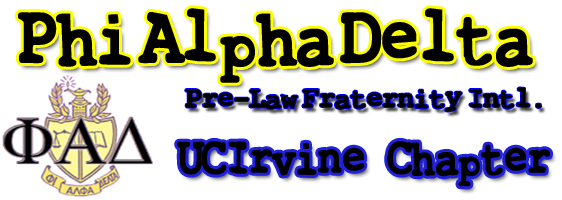|
|

About PAD
Background Info on Phi Alpha Delta by Mimi Jantapakul
Purpose of PAD
Phi Alpha Delta International Fraternity offers students and teachers who are interested in the legal field an opportunity to interact with like-minded people. PAD is the first and only law fraternity to recognize the needs of pre-law students and develop a program to help them as they pursue a career in the law such as through sponsoring an Annual International Conference and a Mock Trial Competition. PAD is also the only law fraternity to receive federal funding from the U.S. Department of Justice for its Law Related Education program and the first law fraternity to enter the information superhighway. The PAD Pre-Law List serve provides a forum for pre-law students to discuss legal topics, programming ideas and chapter events.
PAD at UCI
The Phi Alpha Delta Pre-Law Fraternity at the
Fraternity History
The origin of Phi Alpha Delta is unique because it is the only law fraternity whose roots were nurtured in a legal controversy. On November 4, 1897, the Supreme Court of Illinois adopted a rule for admission to the Illinois Bar which seriously affected many of the students then preparing for admission. To protect their rights, they organized the "Law Student League." This league secured the passage of an act by the Illinois Legislature which exempted the students then studying for the bar from certain requirements of the rule. The Illinois Supreme Court, however, refused to recognize these exemptions, whereupon a test case was taken directly to the Supreme Court of Illinois (see in re Application of Henry M. Day, et al, 181 ILL. 73). The League was partially successful in this new undertaking.
The realization that more could be accomplished by a unified group and the close association formed in this common struggle led the members of the League to seek a way in which to preserve the relationship thus formed. Accordingly, in 1898 they formed the Lambda Epsilon Fraternity; Lambda standing for "law" and Epsilon for "equity."
The founders of Lambda Epsilon undoubtedly meant to establish a law fraternity dedicated to promoting the professional development of its members. Their zeal to ensure that this new organization would remain true to its founding principles led them to place severe restrictive procedures on expansion to other appropriate law schools and to maintain a tight rein on the central government of the fraternity.
In a short period of time, it became apparent that the attraction for this type of organization was of universal interest within the legal profession and that the new organization should be reorganized to allow its benefits to become available throughout the legal profession. Realizing this need, the delegates to the convention held at the Colonial Tavern in South Haven,
Within a month Blackstone, Story, Fuller, Webster and Marshall Chapters were installed. By 1910, the roster had increased to twenty-three in number.
Subsequently, Phi Alpha Delta secure in its principles and purposes has weathered war and de depression and has proceeded along a steady, conservative policy of expansion until at this writing there are chapters chartered at law schools in the
The Fraternity thus has far more active chapters than does any other law fraternity in the world. The Fraternity has initiated over 200,000 members into chapters at accredited schools only.
In September of 1970 Phi Alpha Delta became the first law fraternity to admit women. In 1972 Phi Delta Delta Law Fraternity, the leading fraternity for women was, by joint action, merged into Phi Alpha Delta and 5,000 leading women judges, attorneys and educators became members of Phi Alpha Delta.
The Public Service Center was created in 1978 to conduct foundation-type activities for the Fraternity. Its principal activity has been in the area of law related education. Since its inception, the Center has provided an opportunity for the members to teach young people about the law. Funded primarily through Federal grants, the Center has achieved recognition for its effective programming.
The 1980 Convention adopted a program of Pre-Law Chapters and in the Spring of 1981 the first Pre-Law Chapter of the Fraternity was established at
The fraternity continues to grow and expand its services, benefits and programs to members all across the world.